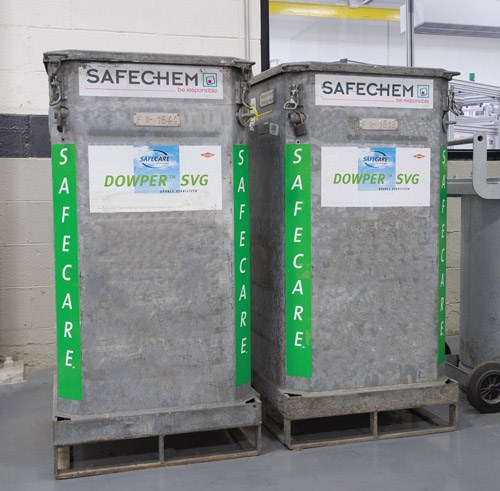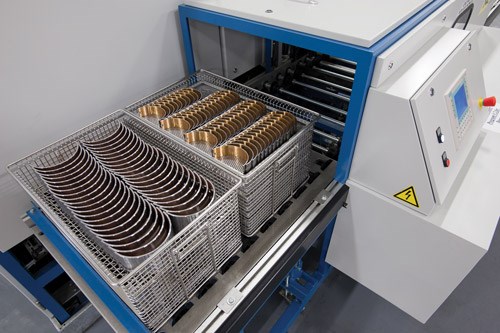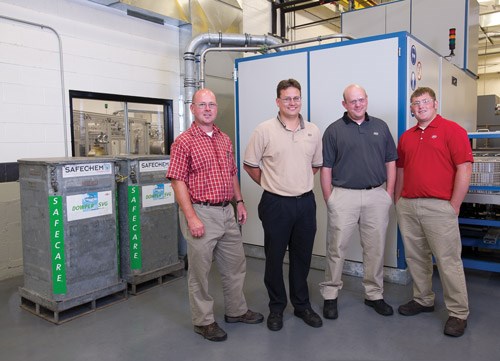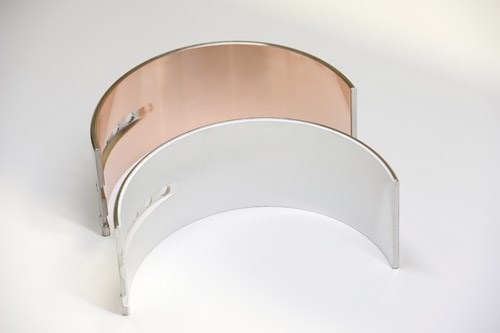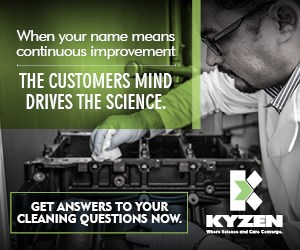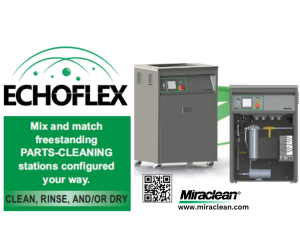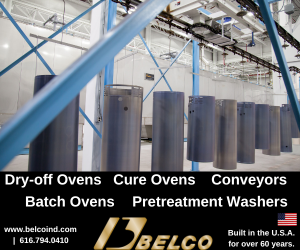Few machines on earth can match the raw power of a diesel locomotive or heavy-duty truck. Yet despite their ability to move huge loads for vast distances, these behemoths of the transportation industry can be brought to a standstill by the failure of a single engine bearing or bushing.
And at Miba Bearings US (McConnelsville, Ohio), precision part cleaning is also an important quality safeguard against component failure, so the diesels that supply power on our rails and roads can keep running strong. The company produces precision metal products, such as crankshaft bearings, connecting rods and camshafts for large diesel engines used in locomotives, over-the-road heavy trucks and gas compressors.
The forming presses, lathes and machining centers in the McConnelsville plant all use a custom-formulated metalworking coolant to help machine the aluminum, bronze and steel used in its products.
Optimize vapor degreasing
To help optimize its solvent vapor degreasing process while minimizing solvent exposure in the workplace and the environment, Miba Bearings US uses Dowper SVG double-stabilized perchloroethylene in the Safecare system from Safechem North America LLC, a subsidiary of
Dow Chemical Company The Safecare system works in tandem with a state-of-the-art sealed vacuum degreaser to allow Miba Bearings US to achieve essential precision cleaning results while effectively managing its solvent use.
After finish machining, bearings must be thoroughly clean and free of coolant and other residues prior to electroplating, physical vapor deposition or polymer coating. Miba Bearings US applies these coatings to its products for dry lubrication protection and part-to-part surface conformability, and to embed small contaminant particles during engine operation for additional protection.
Kelly Smith, business unit manager for Miba Bearings US, is happy with the system.
“The integration of the Safecare system with our equipment went very smoothly,” he says. “The Safechem people were very familiar with our Pero degreaser and provided everything we needed to integrate the Safecare system with our cleaning equipment. They’ve made the overall management of new and spent solvent very easy for us. We’re also very pleased with the technical support Safechem has provided.”
Coating integrity depends on thorough pre-cleaning
Miba Bearings US had worked with a number of different solvent systems to achieve the required part cleanliness. Smith says that calibrated ink testing consistently showed that a specially formulated solvent based on perchloroethylene was the ideal choice, given the coolant formulation and the three metallurgies involved.
He says the company was encouraged to adopt sealed cleaning technology by its parent, Miba Bearing Group, which uses sealed cleaning systems in its other global operations and strives to standardize production methods for products manufactured anywhere in the world. Not only did Miba Bearings US want to conform to corporate standards, but Smith says the company also wanted to manage worker health and safety, and environmental impact.
Miba Bearings US installed a Pero V2 sealed vacuum degreaser, which has a solvent capacity of 220 gallons and can clean about 400 lbs. of bearings every 10 to 12 minutes. As Miba Bearings US gained experience with the new sealed system, the company decided to also adopt the solvent handling system used by Miba Bearing Group, the Safecare system from Safechem.
According to Sherry Emmrich, senior technical specialist for Safechem, the system and related products and services are designed to help customers reduce workplace and environmental exposure risks related to solvent vapor degreasing while also helping to optimize cleaning process effectiveness and minimize solvent consumption and expense.
“The system allows users of sealed vapor degreasers who have already taken a major step to minimize solvent emissions and worker contact to further close their cleaning process from solvent delivery to removal,” she says.
Double-walled containers
The system delivers chlorinated and modified alcohol solvents manufactured by Dow, using sealed, double-walled containers for transport of fresh solvent and removal of waste solvent from metal working operations. Emmrich says the transfer equipment—including hoses, couplings, vapor returns, vacuum breakers and valves — are tailored to the needs of each installation to ensure a totally closed process for delivering and removing solvent.
In addition to the Safecare system itself, Emmrich says Safechem provides customers with technical support and services designed to help maintain solvents and optimize the cleaning process. These services include solvent training, comprehensive analytical laboratory services, Maxicheck test kits for on-site self-testing, Maxistab solvent stabilizers and Maxiboost additives. Solvents are delivered by local chemical distributors, and waste removal is managed by reputable waste handling companies, relieving users of the responsibility for arranging proper waste disposal or recycling.
Smith says that Miba Bearings US has also enjoyed excellent results with the completely sealed vacuum degreasing system.
“To begin with, we’re getting very effective cleaning,” he says.
“Our monitoring tests show we’re getting very predictable cleaning results, which gives us greater confidence that our parts will coat well and hold up in service.”
Pleased with the process
Keith Lang, manufacturing engineer for Miba US, is also pleased with the process. “We’re very happy with our operating economics,” he says. “The sealed vacuum degreaser maintains higher solvent temperatures through load and unload cycles. It uses less energy for solvent heating, and we’ve cut our cleaning cycle time in half as well as reduced our solvent consumption, which, in part, helps me justify the investment.”
“The new sealed system loses less than 50 gal. per year; that’s clearly better for our people and the environment,” he says.
“And the Safecare system just adds to the advantage. Sometimes it just doesn’t feel like we’re working with solvents anymore, but the excellent cleaning results remind us that we are.” n
For information from Safechem North America, a subsidiary of the Dow Chemical Co., visit dowSafechem.com or call 877-376-8343.


